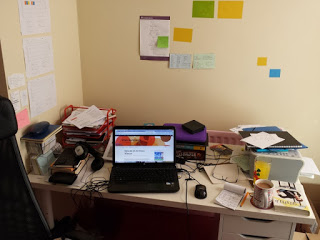I am Nathan Ryder and This is How I Work
 Today, I am interviewing Dr. Nathan Ryder in the “How I Work” series. Nathan loves interesting challenges. This love lead him to a PhD in Mathematics (University of Liverpool, 2008) and then to working freelance as a skills trainer in higher education. Nathan’s main interests are in helping postgraduate researchers prepare for their viva, practice creativity, collaboration, productivity and personal effectiveness.
Today, I am interviewing Dr. Nathan Ryder in the “How I Work” series. Nathan loves interesting challenges. This love lead him to a PhD in Mathematics (University of Liverpool, 2008) and then to working freelance as a skills trainer in higher education. Nathan’s main interests are in helping postgraduate researchers prepare for their viva, practice creativity, collaboration, productivity and personal effectiveness.
In 2012 he launched the Viva Survivors Podcast (www.viva-survivors.com), a podcast where he interviews PhD graduates about their research and viva experiences. He is the author of “Fail Your Viva – Twelve Steps To Failing Your PhD (And Fifty-Eight Tips For Passing)” (2013) and “The Viva: Who? What? How?” (2015), two books to help PhD candidates with preparing for the viva.
Current Job: Freelance skills trainer and writer
Current Location: Wallasey, UK
Current mobile device: Samsung Galaxy S4 with a 64Gb SD card.
Current computer: HP Pavillion g6 laptop. I think about upgrading it some times, but I don’t want a new version of Windows to get to grips with!
Can you briefly explain your current situation and research to us?
Finished my PhD in 2008 and started a business as a freelance skills trainer working with postgraduate researchers and research staff. It took time to build up; I think I’m most well known for doing workshops about the PhD viva. I run a podcast called Viva Survivors where I interview PhD graduates about their research, their viva and life after the PhD. In 2014 I did some research into viva experiences. I’m the author of two books on viva preparation, and am currently working on several new writing projects.
What tools, apps and software are essential to your workflow?
For the podcast I use Skype and a piece of software called Pamela to record audio, then edit in Audacity. I use WordPress on my two sites – nathanryder.co.uk and viva-survivors.com – and aside from paying for some design help with the former I’ve managed everything else on both sites.
I use Buffer to schedule tweets about the podcast and for sharing blogposts. This has been enormously helpful to me. I have a varying schedule of when I am working from home and when I am delivering workshops: it is great to have the flexibility of planning ahead for both the podcast and my blog.
Pocket is another great app/service – it lets me to store articles and links for later reading, and like lots of great apps synchronises across desktop, phone etc. I prefer Google Keep for similar reasons – I can make a note anywhere and know that it syncs up (I wrote the first draft of this post on my phone using a Bluetooth Keyboard and in Keep!).
When writing, I use a pair of noise-cancelling headphones, sometimes without music.
What does your workspace setup look like?
When I’m delivering workshops I have to take what I’m given. Some rooms are better than others.
At home, I have a shared office space with my wife (who is also a writer). We share a desk, which we aim to keep tidy but which often isn’t. I have a bookcase which has some work-related books, and also some hobby-related things as well.
I find that I work well at home when writing, doing admin-related things and so on. For things like planning, editing and reading, I’ll take myself to our local Costa. It takes around 10 minutes to walk to, which lets my brain relax a bit. I tend to sit in one of two places along the back wall of the cafe, depending on what’s free and on if I am editing podcast audio. If I’m not, then I try to catch up on listening to other podcasts – at the moment I am hooked on working my way through the back catalogue of the Tim Ferriss Show.
What is your best advice for productive academic work?
Don’t overschedule. Everyone has lots of things they want to do and lots of priorities. Writing things down on a to do list will not help by itself. Just because they are on a list does not mean that they will get done. Really think about what you can do in ten minutes, an hour, a day, a week. Plan accordingly. Review your progress and look to see why you did or didn’t get something done.
How do you keep an overview of projects and tasks?
I break things down into smaller steps. For a new writing project I’ve made a visual wall chart to mark out progress.
Besides phone and computer, do you use other technological tools in work and daily life?
I have a pair of noise-cancelling headphones that I’ve had for nearly five years, and which work great but are starting to wear out. They’re Sennheiser HD201s, and even when I don’t have music or a podcast playing, they work really well to insulate me from the rest of the world.
What do you listen to when you work?
It varies. If I am writing, sometimes I listen to nothing, I’ll just have my headphones on and work in silence. If my energy is low, or if I’m looking for a particular energy in what I’m writing I might listen to one of a few playlists I’ve curated. And sometimes I’ll listen to episodes of Comedians In Cars Getting Coffee in a background tab.
What are you currently reading? How do you find time for reading?
I’ve just finished reading a book on being a productive writer – The 7 Secrets Of The Prolific. Lately I’ve been reading lots of books on self-development. I generally read when I’m travelling for work (I go everywhere by train), and try to purposefully set time aside when I’m working from home. A few days ago I also read The Day of the Triffids by John Wyndham. I like to read a wide range of things!
Are you more of an introvert or extrovert? How does this influence your working habits?
100% Introvert. It means that I have to think about how to find time to be by myself in order to recharge. I just make sure that I always have down time. In terms of writing, it helps to have headspace by myself.
What’s your sleep routine like?
It could be better! We have a 22-month old daughter, and in the last few years what was a routine of seven straight hours of sleep has really fallen apart. Most nights I aim to go to bed between 10:30 and 11, but more often it is between 11 and 11:30. Most mornings I get up between 6 and 6:30, but lately this has been skewing towards 5:30. On days when I have to deliver a workshop and am travelling from home I’ll get up around 5:30. All of this means that in theory I could get 7 hours of sleep – I tend to fall asleep quickly – but most nights I’ll wake up at some point to give my daughter a cuddle if she wakes up.
What’s your work routine like?
When working from home I like to get up, have a cup of tea and empty my head of ideas that are coming to the surface. When I go to the office, most days my plan is to write 1000 words at a minimum, and to do this first before other tasks. I have set my email client to only ping the server every hour or so – and for my personal account every six hours – so that I don’t get alerts all of the time. Following advice from lots of sources, I’ve started batching my emails together, and have followed suggestions to make them more useful (shorter, more direct, clearer questions). I sometimes do purely creative things in the afternoon, but more often than not leave it for reviewing, reading and revising things. Or doing research of one form or another.
What’s the best advice you ever received?
That there’s a difference between being busy and being productive. Even a few years ago I would say I was busy all of the time, but really I was spending a lot of time on things that were either not developing my skillset, my business or both. To help with balancing our family life I dropped down to working four days a week, and this has had no negative impact at all in terms of the business or my outputs: if anything, I’m doing more and producing more now!

